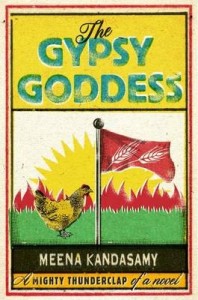
Released in hardback on the 3rd April 2014, it’s a post-modern debut that’s well worth putting the effort into. It’s laced with a sort of gonzo spirit that features Meena as much as it does the horror of the storyline. Angry and unwilling to bow to literary conventions in any way shape or form, apart from when she’s mocking them, it’s very much Meena’s take on the atrocities that took place in rural Tamil Nadu, told exactly as she wants, and it has a lot of impact as a result.
Though The Gypsy Goddess is a novel, it is founded in the horrific realities of the oppression of agricultural serfs in India by feudal landlords and the counter struggle of the Communist Party, and their village members, to protest for better pay, rights and conditions. It culminated in the most devastating atrocity of the struggle, the massacre of Kizhavenmani, where 42 villagers were trapped inside a hut and burned alive by their landlord masters.
It’s this shocking crime against humanity that the book centres upon with its own, more admirable, brute force, to remind the world that greed, power and oppression are vicious realities that need to be weeded out on a constant basis.
However, this is far from a simple chronologically accurate description of events, or a breakdown of the social, political, economic and environmental conditions that surrounded the occurrence, although elements of this are covered. This is a thoughtful, but angry shout back in time to the sheer injustice and barbaric nature of the massacre and the people that made it, or allowed it to happen.
It also acts as a pointed critique of the Indian caste system, as all of the victims were untouchable Dalit agricultural labourers, that were segmented and ostricised by the higher orders of society at the time. In the same system, their oppressors were landlords that were much higher up in the hideous pecking order, which along with their money and power, enabled them to treat these workers in the worst possible ways imaginable.
The book is clearly very well researched, and you get a taste of the effort that Meena has put into getting beneath surface of the incidents in the details on the page and the thanks at the end of the book. It’s this dedication that makes the book so incredibly convincing and all the more powerful, allowing her freewheelin’ style to achieve a level of substance that meets up to the thunderclap claims on the front cover.
Perhaps the only negative we could suggest about The Gypsy Goddess is that there’s a hint of self indulgence in the post modern, left-field writing style of Meena Kandesamy. However, what that makes for is a much more personal view of the events, as well as a lot of variety in writing style and structure, which on the whole makes for a refreshing read. Reading about the massacre of 42 (plus 2, silent) men, women and children who were trapped in an village hut on the 25th December 1968 and burned to death by their feudal landlords is far from refreshing, but Meena’s delivery is just that; a breath of fresh air to swirl up the horror and charred smoke of the past and lay it out bare for us all to comprehend, if not entirely understand.
Unapologetically apologising for her disregard for writing norms, and reiterating the inability to truly grasp the complexity of the situation with Indian language, dialect and names, Meena Kandasamy’s The Gypsy Goddess is an uncompromising novel that challenges the reader to think well beyond the confines of their everyday lives and reading.
Meena Kandasamy’s The Gypsy Goddess review: 4.6/5
Share our review of Meena Kandasamy’s The Gypsy Goddess with:



Kudos to you for selecting to write on such an atrocious incident which happened in the independent(so called) India and making it available to the world at large.
Waiting for its release in India..